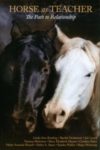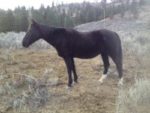Aromatherapy for your Horse Part 2: Some practical application tips & info on specific herbs
by Yvonne Allen
How to Administer Essential Oils Internally
For internal use (ingestion), essential oils can be put into a capsule and mixed with the feed. The bottom lip can be pulled out and 10-15 drops of oil put in. The animal will feel the effect quickly because capillaries in the lip will carry the oil into bloodstream immediately. When treating horses with essential oils internally, make certain the oils used are pure and free of chemicals, solvents and adulterants. Always seek the advice of a qualified veterinarian before allowing the animals to ingest essential oils.
Where to Apply Essential Oils to Horses
Sprinkle a few drops on the spine or flanks and massage them in. Also apply on the gums, tongue or underneath the top lip; also apply to the frog and cornet bands of hooves. These are good locations for oils to be applied to both horses & donkeys. Oils can be also applied to auricular points of the ears.
Other Helpful Hints
- When treating horses for viral or bacterial infection, arthritis or bone injury, generally use the same oils and protocol recommended for humans.
- For applying to large open wounds or hard to reach areas it helps to put the oils in a spray bottle and spray them directly on location.
- After an oil application to an open wound, cover the wound with Animal Scents Ointment to seal it and protect it from further infection. The ointment will also prevent the essential oils from evaporating into the air.
- There is not a right or wrong way to apply essential oils. Every horse is different. Use common sense and good judgment as you experiment with different methods. Observe carefully how the horse responds to the treatment.
- Take special care not to get essential oils in the horse’s eyes.
- Make sure the horse is drinking pure water. Chlorinated water will suppress thyroid and immune function in animals even quicker than in humans and when that happens you will suppress the healing process of that animal whether it is a dog, horse or a cat.
- Quality protein is vitally important to promote healing which makes the use of organic feed essential. Unfortunately many commercial feeds contain bovine byproducts that have high risk for BSE disease and make them unfit for animal care. Avoid these at all costs. Enzymes are also essential to maximize digestion and protein assimilation.
Oils: Reference Guide For Horse & Rider
Basil – The strong and spicy aroma of Basil has been noted to help restore mental alertness during times of fatigue and exhaustion. A great essential oil to offer your horse on the last day of your event.
Bergamot – Helps to relieve the butterflies in the stomach when nervousness becomes a problem. It helps to lift away feelings of anxiety and provides a sense of harmony in otherwise tense situations.
Chamomile – Chamomile has an amazing tendency to provide a deeper sense of relaxation. Great to use on young horses that are required to learn more patience, eg: learning how to tie.
Cypress – For the insecure horse and or rider, Cypress may invoke the confidence needed to break through emotional barriers. Cypress has been said to restore feelings of security.
Eucalyptus Radiata – Eucalyptus delights us with a light and refreshing scent which may help to soothe away the winter blues. Try diffusing in your barn and let this light scent to freshen up any unwanted odours.
Frankincense – Frankincense is another important oil to have in your essential oil kit. It has been used for thousands of years to help clear past emotional pain and memories. Frankincense is an excellent oil to choose for working with issues of great fear.
Juniper – This clean and woody scent has been said to have a cleansing effect on the mind, body and spirit. Juniper is a great essential oil on those days when seeking peace and clarity.
Lavender – The fresh, sweet and floral scent of Lavender has been known to calm anxiety and assist the body when adapting to stress or imbalances. It may help to calm a sensitive horse and or rider.
Lemongrass – Lemongrass’s light, fresh and citrus aroma is rejuvenating to the senses and may assist in helping one to retain new information. Try diffusing or using aromatically while studying for your next dressage test or examination.
Marjoram – Marjoram’s spicy aroma is a calming oil and has been known to have a soothing effect on sore and tired muscles. A favourite of many equine athletes and their riders!
Melaleuca Alternifolia – Tea Tree Oil has been highly regarded for it wide range of uses and has been known to be gentle on the skin. It is used in some body washes to cleanse and condition the skin. A great oil to use on insect bites or minor cuts for cleansing.
Patchouli – This essential oil helps to ground the horse so as they are more aware of their body and how they are using it. Provides a deeper sense of connectiveness to the work at hand.
Sweet Orange – Sweet Orange helps provide one with the feeling of warmth and coziness. It is a very connecting essential oil to share with your horse.
Vetiver – Vetiver is a great essential oil choice to assist in calming and grounding ones emotions. Try it on your young mis-behaving yearling!


